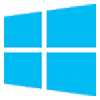
 |
Windows Guide |
Windows has a cmd.exe a command prompt. Also, you run the more powerful powershell.exe to load the new Powershell command prompt.
To create a simple bootable floppy, insert a floppy disk in A: drive, open My Computer, right click A: icon and select Format, there is a option to create a MS-DOS startup disk.
To create a bootable USB or DVD disk and you use a BIOS (Basic Input Output System) ROM, then you use the Windows Media
Creation utility.
If your PC has a UEFI ROM then you can use the Rufus boot utility.
Unlike MS-DOS or Windows 9x, Windows does not run a Config.sys or Autoexec.bat on startup.
Instead you can run a script when loading the command prompt from a shortcut e.g.
C:\Windows\System32\Cmd.exe /K: c:\Scripts\Auto.bat which will load the command prompt and run the auto.bat script and leave the window open. For Powershell, you can run
Powershell -Command command , or -File script-file or Powershell_ISE -File script-file.
Environment variables are defined in the System Control Panel (see the Advanced tab, Environment Variables button) which defines the PATH, TEMP, and TMP variables among others.
You can configure temporary variables using the SET command, these are lost when the command window closes.
The command prompt supports most common commands such as Cd, Copy, Del, Erase,
Doskey, Dir, Move, Tree, Xcopy, Edit, Exit, Sort, Subst, Attrib, If, Help, Share, Choice, Net and others.
To view the syntax of a command enter command /? or Get-Help command.
The PowerShell has a wide range of command including Set-Location, Copy-Item, Remove-Item, Move-Item, Get-Item, Get-Process, Get-Help, Get-Event, Get-Date, Set-Date using its verb-noun formatted commands.
If a old program cannot be run in Windows command prompt, then you can use the powerful DosBox tool which will completely virtualise the DOS environment for you.
In more recent version of Windows, you can use the new Windows Terminal which updates the old command prompt.
| File System Commands | Purpose |
| append <dir> | Add directory to data path when opening files |
| attrib <file> <attribs> | Set or display attribute flags of file(s) |
| cd <directory> | Change directory. To change drive just enter name of drive letter followed by a colon e.g. C: |
| copy <source> <dest> | Copy one or more files (the ? and * wildcards can be used to select files) |
| xcopy <source> <dest> | Extra copy of file and/or subdirectories to another folder. |
| del <files> | Delete one or more files |
| erase <files> | Erases one or more files |
| md <directory> | Make or create a directory |
| rd <directory> | Remove or delete a directory |
| ren <orig> <new> | Rename file(s) |
| move <source> <dest> | Move file(s) to another folder or drive |
| type <file> | Display contents of a text file |
| more < file | Display contents of a file a screen at a time |
| edit <file> | Change contents of a file |
| find "string" <file(s)> | Search for string in a file |
| comp <file1> <file2> | Compare two files |
| compact <file> | Compact or compress a file |
| cipher | Set or display encryption settings for folders |
| chkdsk | Check disk for errors |
| convert | Convert filesystem to another filesystem e.g. NTFS |
| defrag | Defragment a filesystem |
| diskpart | Disk Partitioning program |
| edlin <file> | Line editor (use ? for help) |
| expand <file> | Expands a compressed file |
| takeown | Take ownership of files or folders |
| Other Commands | Purpose |
| mode | Settings for serial and parallel ports in DOS mode |
| print <file> | Print file to LPT1 or other device |
| schtasks | Set up scheduled tasks |
| arp | Settings for Address Resolution protocol |
| bootcfg | Set or display boot configuration (boot.ini) |
| cacls | Set or display NTFS permissions |
| chcp <n> | Change code page |
| cmd | Open a command window (see above) |
| cscript <file> | Run a VB or other script |
| diskperf | Enable or disable disk performance counters |
| dism | Deployment Image and Servicing Management tool for images and disks. |
| doskey | DOS command history utility |
| driverquery | Display installed drivers |
| eventcreate | Utility to create events in the event log |
| exe2bin | Converts executable files to binary format |
| control <cpl file> | Load a control panel |
| dxdiag | DirectX Diagnostics |
| sfc | System File Check (check for missing or corrupt system files) |
| bcdedit | Change boot configuration |
| bitsadmin | BITS (Background intelligent transfer service) Administration |
| cmdkey | Administers stored credentials |
| choice | Choose between different options |
| dvdplay | Play a DVD using Windows Media Player |
| ftp | File Transfer protocol |
| getmac | Get machine's physical address for network card |
| hostname | Display PC's hostname |
| mountvol | Mount volumes |
| openfiles | Displays or disconnects open files |
| pnputil | Plug'n'Play utility to install, uninstall and manage drivers. |
| recimg | Recovery image settings |
| robocopy | Robust file copy |
| rundll32 | Run functions from within dynamic link libraries (DLLs) |
| syskey | Secure user accounts with more encryption |
| sc | Service Control manager |
| shutdown | Shutdown, restart or logout from PC |
| taskkill | Kill tasks |
| PnPUtil | Plug and Play Utility (install drivers) |
| RpcPing | Remote Procedure Call ping tool |
| powershell | Load powershell |